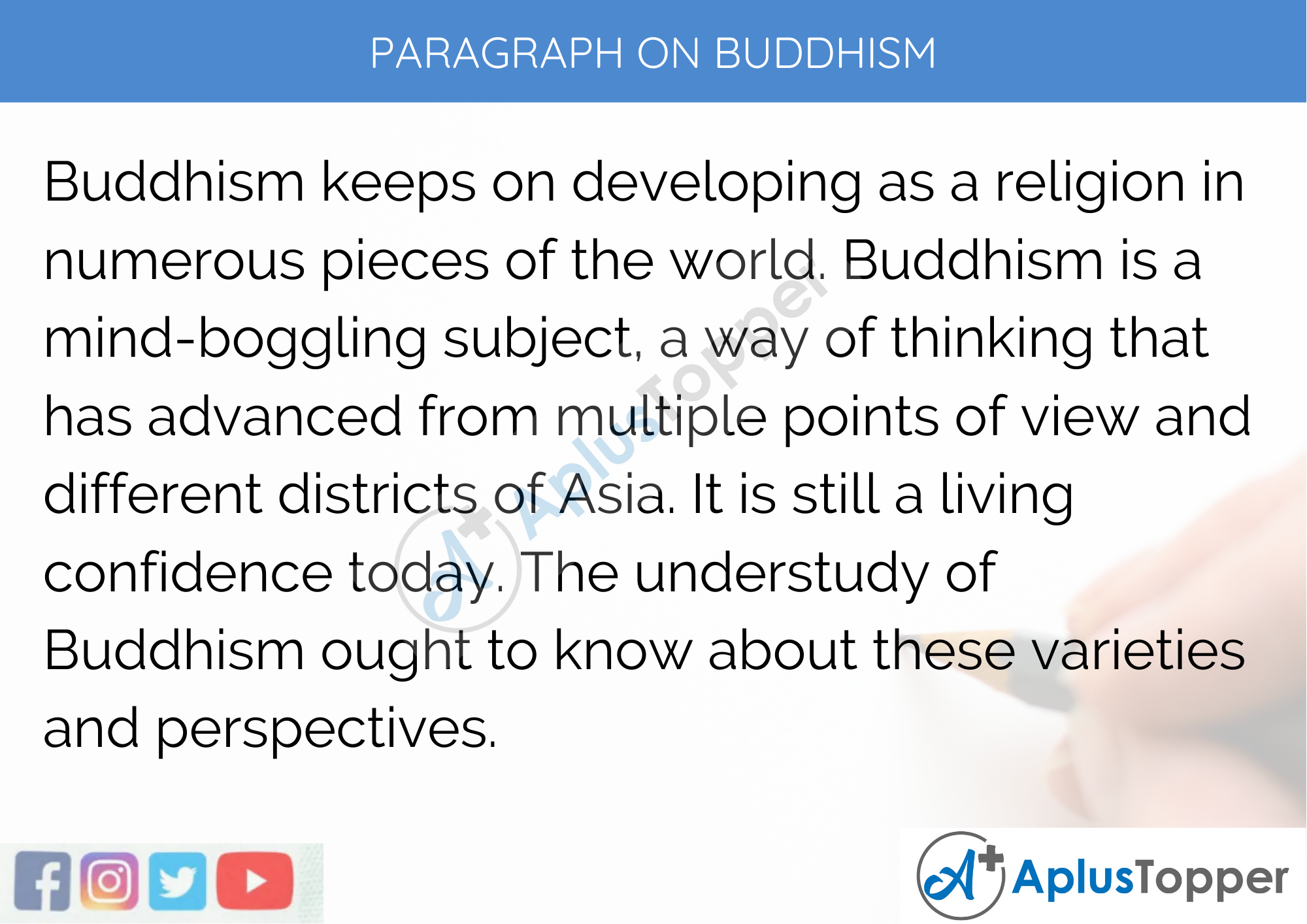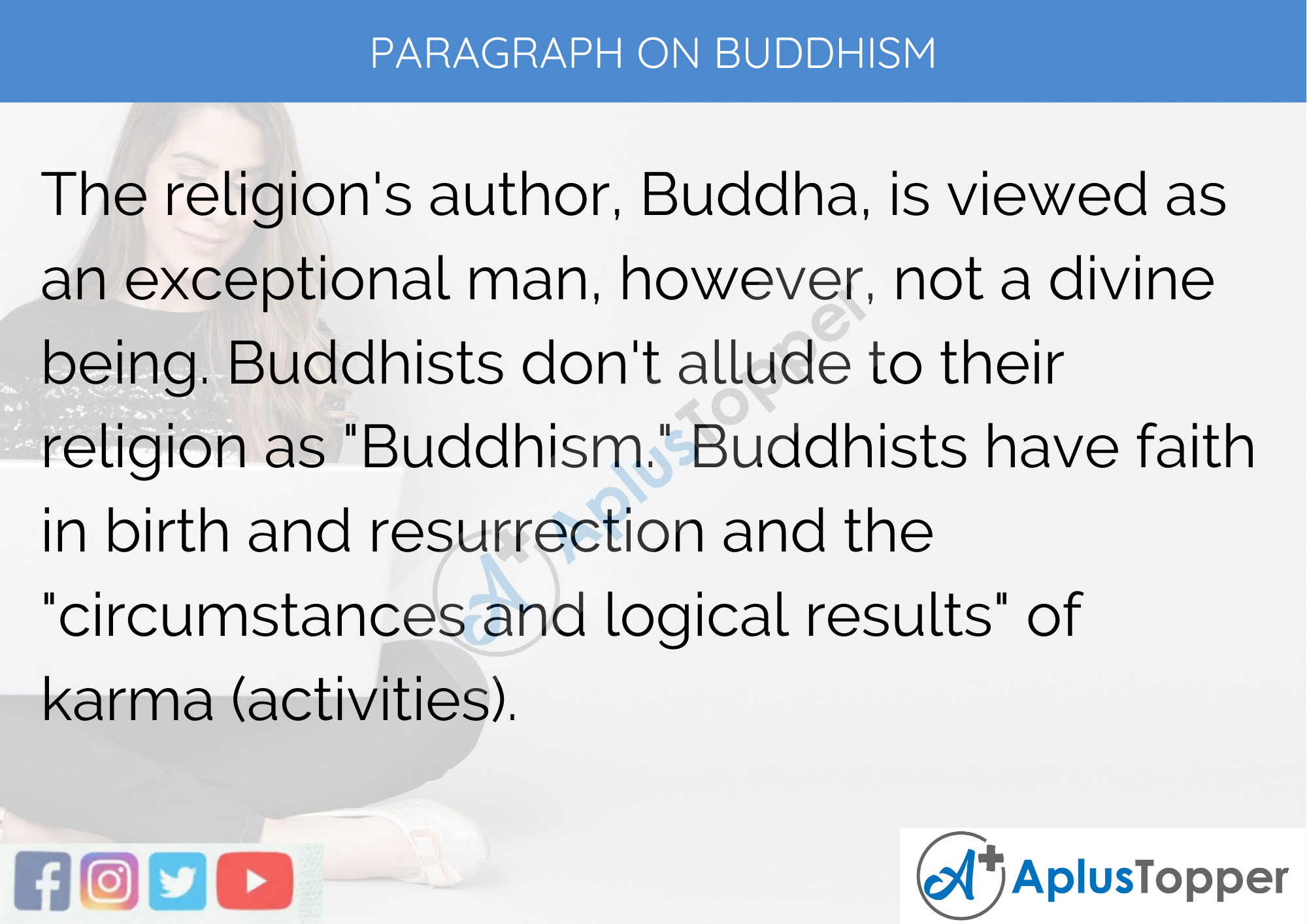Paragraph On Buddhism: Buddhism is one of the world’s extraordinary religions and has profoundly impacted the character and advancement of Asian human progress in recent years. It depends on the lessons of a chronicled figure, Siddhartha Gautama, who lived around the fifth century B.C.E. Buddhism assimilated indigenous convictions and fused a wide scope of symbolism.
You can read more Paragraph Writing about articles, events, people, sports, technology many more.
Paragraph On Buddhism – 100 Words for Classes 1, 2, 3 Kids
Buddhism keeps on developing as a religion in numerous pieces of the world. Buddhism is a mind-boggling subject, a way of thinking that has advanced from multiple points of view and different districts of Asia.
It is still a living confidence today. Giving straightforward definitions to the convictions and artistry verifiable improvements of Buddhism is, in this way troublesome, because such a significant number of varieties happen.
The understudy of Buddhism ought to know about these varieties and perspectives. Here we give an exceptionally broad review as an establishment for taking a gander at authentic Buddhist expressions, concentrating on India’s specialty.

Paragraph On Buddhism – 150 Words for Classes 4, 5 Children
As aggregate confidence, Buddhism first created in quite a while with the recorded Buddha’s adherents, who framed a network of priests and laypersons during his lifetime. Those wishing to join the religious request denied family and common ties and broadcasted their confidence in the “three gems”: the Buddha, the tenet (dharma), and the ascetic network (Sangha).
After the Buddha’s demise, concerns emerged concerning the translation and endurance of the request and precept. A first chamber set up an allowance of faith-based expectations based on those enduring priests who could recollect what the Buddha had said—ensuring boards added to these platitudes.
Discussions emerged over the clear, logical inconsistency between no-self and resurrection (how might one be renewed if there was no self?), and over the inquiries of who could be educated and whether edification was slow or unconstrained. By the start of the first thousand years, there were roughly eighteen distinct schools of Buddhism in India.
Paragraph On Buddhism – 200 Words for Classes 6, 7, 8 Students
Western researchers instituted the term ‘Buddhism’ during the 1830s. Buddhism started from around 400BC with the recorded individual known as the Buddha. The first notice of the Buddha in Western composing is in the works of Clement of Alexandria, 2 AD. The Buddha established a request for priests and nuns known as the Sangha, who has protected his lessons down to the current day.
Buddhism is a large and inside different convention with two principal branches. With 360 million supporters, Buddhism is the fourth biggest religion on the planet. In Buddhism, there is no single heavenly book. Broad sacred writings have been saved in numerous Asian dialects.
Buddhists don’t have confidence in an incomparable being or maker god. As a result of its accentuation on contemplation and care, Buddhism is frequently viewed as a type of brain science as opposed to a religion. Numerous conventional Buddhists put stock in resurrection and resurrection.
Current Buddhists accept this thought can be cast-off without losing any focal worth. Devotees of Buddhism don’t recognize a preeminent god or divinity. They rather center around accomplishing edification—a condition of inward harmony and shrewdness. At the point when adherents arrive at this profound echelon, they’re said to have encountered Nirvana.
Paragraph On Buddhism – 250 to 300 Words for Classes 9, 10, 11, 12 And Competitive Exams Students
The religion’s author, Buddha, is viewed as an exceptional man, however, not a divine being. Buddhists don’t allude to their religion as “Buddhism.” Buddhists have faith in birth and resurrection and the “circumstances and logical results” of karma (activities).
Buddhists try to be liberated from this cycle by understanding and following up on the educating of the Buddha. These lessons are summarized by the Three Universal Truths, the Four Noble Truths, and the Eightfold Path, known as the Dharma.
The word Buddha signifies “illuminated.” The way to illumination is accomplished by using decent quality, contemplation, and knowledge. Buddhists regularly think since they trust it stirs truth. There are numerous ways of thinking and understandings inside Buddhism, making it an open-minded and developing religion.
A few researchers don’t perceive Buddhism as a sorted out religion, but instead, a “lifestyle” or a “profound custom.” Buddhism urges its kin to stay away from guilty pleasure yet additionally abstemiousness. Buddha’s most important lessons, known as The Four Noble Truths, are fundamental to understanding the religion.
Buddhists grasp the ideas of karma (the law of circumstances and logical results) and resurrection (the nonstop pattern of resurrection). Devotees of Buddhism can revere in sanctuaries or their own homes. Buddhist priests follow an exacting set of accepted rules, which incorporates chastity.
There is no single Buddhist image. However, various pictures have advanced that speak to Buddhist convictions, including the lotus blossom, the eight-spoked dharma wheel, the Bodhi tree, and the symbol (an old image whose name signifies “prosperity” or “favorable luck” in Sanskrit).

FAQ’s on Paragraph on Buddhism
Question 1.
What are the primary concerns of Buddhism?
Answer:
The Four Noble Truths of Buddhism: 1) presence is enduring, 2) the reason for enduring is needing, and connection, 3) enduring stops eventually and goes to Nirvana (freedom or all-out euphoria) and 4) there is a way to Nirvana which is comprised of eight stages, once in a while called the Eightfold Path.
Question 2.
What is the historical backdrop of Buddhism?
Answer:
Buddhism that got established in the late sixth century B.C.E. by Siddhartha Gautama (the “Buddha”) is a significant religion in a large portion of the nations of Asia.
Question 3.
Is there a divine being in Buddhism?
Answer:
There is no confidence in an individual God. Buddhists accept that nothing is fixed or perpetual and that change is consistently conceivable.
Question 4.
What is interesting about Buddhism?
Answer:
In Buddhism, there is no single heavenly book. Broad sacred writings have been protected in numerous Asian dialects. Buddhists don’t put stock in an incomparable being or maker god. On account of its accentuation on reflection and care, Buddhism is regularly viewed as a type of brain research as opposed to a religion.
